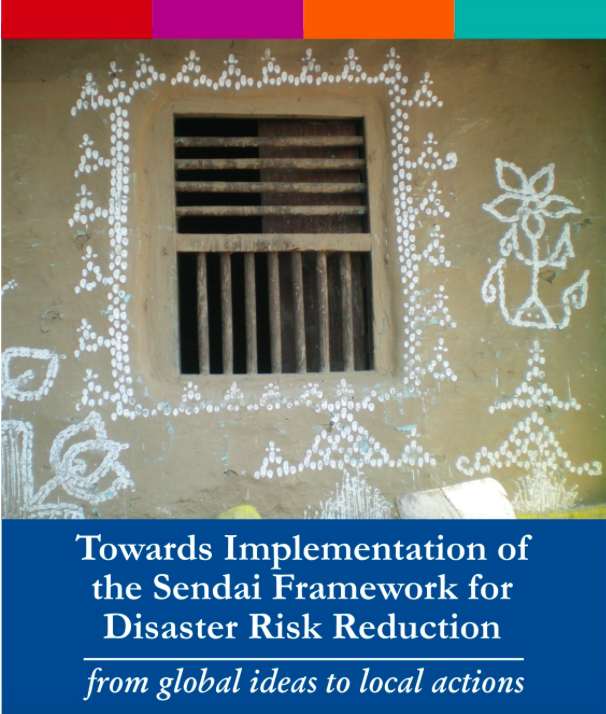Shaping the future: Our strategy for research and innovation in humanitarian response.

Shaping the future: Our strategy for research and innovation in humanitarian response.


Investing in Disaster Risk Reduction for Resilience
The innovation is a small business disaster microinsurance programme to enhance recovery of local markets that play a critical role in providing goods and services as well as livelihoods to disaster-affected populations in urban settings.
The Sendai Framework places emphasis on local actions. The success of the Sendai Framework for Disaster Risk Reduction (SFDRR) will be measure by targets such as to reducing the number of disaster-affected people; reducing direct disaster economic loss; and reducing disaster damage to infrastructure and disruption of basic services. To achieve these targets, insurance products to protect vulnerable populations trying to overcome poverty and contribute to local recovery is highly important.
The project team is advocating for this risk transfer and insurance at different levels, especially for promoting and strengthening a mechanism for people contributing to the informal economy and located in poor areas that are exposed to various hazards including climate risks.
The project team is supporting the implementation of the Sendai Framework for Disaster Risk Reduction. Priority 3 – Investing in disaster risk reduction for resilience – of SFDRR is directly linked to the efforts of the project – Innovative Disaster Microinsurance for Local Market Recovery. The project is directly making efforts in line with the Sendai Framework calls for the promotion of mechanisms for disaster risk transfer and insurance, risk sharing and retention and financial protection in order to reduce the financial impact of disasters on societies, in urban areas. The evidence from the project is will be shared with state and national authorities to support the development of a regulatory framework and mechanism for insurance against hazards in India and a wider international audience for widespread scaling. To do so, this requires constant and active participation in policy dialogues. AIDMI joined the recent Asian Ministerial Meeting on Disaster Risk Reduction (AMCDRR) (ISDR Asia Partnership – IAP), November 17-19, 2015, New Delhi, India. The focus was on implementation of SFDRR in Asia and pathways towards ‘Asian Ministerial Conference on Disaster Risk Reduction 2016’ that the Government of India is hosting. This will be first post 2015 AMCDRR.
The project team emphasised the coverage of Risk Transfer and Insurance in the AMCDRR. The project team shared the learning from the project with the intention to highlight risk transfer and insurance as one of the key options to achieve the targets of SFDRR in the context of Asia, especially filling a need in urban areas that are market driven. The findings based on the progress so far highlighted the need to build protection through disaster insurance that covers the damage of small informal businesses.
Mr. Mihir R. Bhatt was invited to join the panel on ‘Local Risk and Resilience’ of IAP. The following project based experience was shared with the audience:
The project team is going to engage further with the NDMA and ISDR on implementation of SFDRR particularly on risk transfer and insurance under the upcoming project actions.
The project team is busy in the development of an insurance product for informal small businesses and also designing the 8th South-South Development Academy on Risk ‘Building Urban Resilience Through Risk Transfer: Protecting Small Business and Local Market Recovery’. Various state and national authorities and regional agencies have shown interest to join the event as partners. The project team is creating a platform with three objectives – promote risk transfer as a tool for urban disaster risk reduction in highly vulnerable cities and towns in South Asian countries; showcase risk transfer products and their impacts so far and other replicable approaches for urban disaster risk reduction an link it with adaptation to climate change; and understand gender in the context of DRR and the inclusion of women for a successful risk transfer model.

 Please upgrade your browser
Please upgrade your browser
You are seeing this because you are using a browser that is not supported. The Elrha website is built using modern technology and standards. We recommend upgrading your browser with one of the following to properly view our website:
Windows MacPlease note that this is not an exhaustive list of browsers. We also do not intend to recommend a particular manufacturer's browser over another's; only to suggest upgrading to a browser version that is compliant with current standards to give you the best and most secure browsing experience.